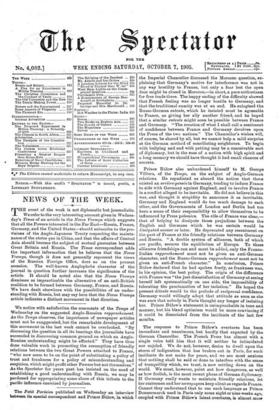T HE event of the week is nob diplomatic but journalistic.
We refer to the very interesting account given in Wednes- day's Times of an article in the Novoe Vremya which suggests that all the Powers interested in the Far East—Russia, France, Germany, and the United States—should subscribe to the pro- visions of the Anglo-Japanese Treaty respecting the mainte- nance of the status quo in China, and that the affairs of Central Asia should become the subject of mutual guarantee between Great Britain and Russia. The Times correspondent adds the important information that he believes that the Novoe Vremya, though it does not generally represent the views of the Russian Foreign Office, does so on the present occasion. The well-known Anglophobe character of the journal in question further increases the significance of the article. It should be noted also that the Novoe Vremya dismisses as impracticable the alternative of an anti-British coalition to be formed between Germany, France, and Russia. We have dealt elsewhere with the possibilities of an under- standing with Russia, but may say here that the Novoe Vremya article indicates a distinct movement in that direction.
We notice with satisfaction the comments of the Temps of Wednesday on the suggested Anglo-Russian rapprochement. As the Temps observes, the importance of newspaper articles must not be exaggerated, but the remarkable development of this movement in the last week cannot be overlooked. "By discussing the question in all its bearings the journalists have succeeded in discovering common ground on which an Anglo- Russian understanding might be effected." They have thus done valuable work in promoting the resumption of friendly relations between the two Great Powers attached to France, "who now seem to be on the point of substituting a policy of trust and frankness for a policy of misunderstanding and suspicion, which might profit other Powers but not themselves." As the Spectator for years past has insisted on the need of establishing a good understanding with Russia, we may be pardoned for appropriating some share of this tribute to the pacific influence exercised by journalism.
The Petit Parisien published on Wednesday an interview between its special correspondent and Prince Billow, in which
[ REGISTERED AS TRICE "D. NEWSPAPES. BY POST.. 63D. POSTAGE ABROAD leD.
the Imperial Chancellor discussed the Moroceo question, ex- plaining that Germany's motive for interference was not in any way hostility to France, but only a fear lest the open door might be closed in Morocco,—in short, a pure enthusiasm for free trade there. The happy ending of the difficulty showed that French feeling was no longer hostile to Germany, and that the traditional enmity was at an end. He eulogised the Russo-German entente, which he insisted must be agreeable to France, as giving her ally another friend, and he hoped that a similar entente might soon be possible between France and Germany. "The creation of what I shall call a sentiment of confidence between France and Germany devolves upon the Press of the two nations." The Chancellor's wishes will, of course, be shared by all, but we cannot help a mild surprise at the German method of conciliating neighbours. To begin with bullying and end with petting may be a conceivable sort of diplomacy, but in the ease of a nation with high spirit and a long memory we should have thought it had small chances of
sticeestli.


























































 Previous page
Previous page